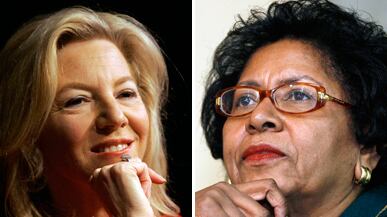From her bright corner office, University of Pennsylvania President Amy Gutmann looks out over a bustling campus that fills her with pride.
A few years ago, Gutmann tells me, alarmed by what some peer institutions described as a “leadership gap” between male and female undergraduates—an absence of women in upper echelons of power, including academic distinctions such as Rhodes and Marshall scholarships—she took a look around Penn.

She was impressed by what she saw. Women at Penn were taking over historically male organizations, at an impressive rate. Today, the Daily Pennsylvanian masthead is at least half female, and the last three executive editors have been women. Last year, women ran four of the six branches of Penn Student Government. Since 1984, roughly half of Penn’s Rhodes Scholars have been women. More importantly, she says, Penn women seem to feel empowered.
“Women are socialized to be compliant, that’s what pushes us along,” says Brown President Ruth Simmons. “We go to class. We sit in our chairs. We take notes. This compliant behavior allows us to be successful, it’s true, but the compliant personality is not the personality that wants to control. The compliant personality wants approbation.”
“In every arena in which women now have leadership,” Gutmann says, “if you go back just a few decades, people said it wouldn’t happen. It was always that women chose something different, which is true. But the myopia of that is not seeing how a culture can change, and how opportunities and external environment make a difference in what women choose.”
“What is clear, at Penn,” Gutmann says, “is that there is something in our culture that has enabled women to rise to leadership positions.”
Is it something in the Philadelphia water? Across the Ivy League, men dominate top jobs in student government and campus political organizations, while women lean towards community service, cultural societies, and residential leadership. Student newspapers tend to fluctuate between male and female editorships.
Yale, like Princeton, has elected just one female student body president in ten years. Men dominate Dartmouth’s student government. A woman is at the helm of Brown’s Undergraduate Council of Students, but most of her predecessors have been male. Since 1996, five Harvard women have served as president of the school’s Undergraduate Council, but none since 2003.
These figures are only part of the picture. Certainly, “leadership” is not limited to student government, nor is participation in established student activities a pre-requisite for leadership after college. There is the matter of choice: few female candidates present themselves for student government, which may be due to intimidation, self-doubt, or simply disinterest. (At many of these schools—Penn seems to be an exception—student governments struggle for respect and legitimacy.)
But the numbers do reflect the gender imbalance in the working world.
“What our women students do as undergraduates sets them on a path for life—if our women students don’t make it as leaders, it’s pretty likely that others are not going to, either,” Gutmann says.
For Gutmann, the problem is largely structural—these universities admit highly ambitious people, and if women are less visible on campus, there must be “external barriers,” which must be identified and combated.
Ruth Simmons, the president of Brown University, acknowledges the power of “residual biases” and barriers, but suggests that the gender divide is also a product of cultural norms.
Simmons says women at Brown “participate with a sense that they belong.” But she adds that women are “much more likely to accord the spotlight to others.”
“Women are socialized to be compliant, that’s what pushes us along,” says Simmons, who has a warm, but no-nonsense demeanor. “We go to class. We sit in our chairs. We take notes. This compliant behavior allows us to be successful, it’s true, but the compliant personality is not the personality that wants to control. The compliant personality wants approbation.”
One can trace the problem, if not to the crib, then back to freshman year. Some students seem to arrive on campus as leaders, while others are instantly cowed by their peers.
“If you are surrounded by brilliant people, what makes you feel that you should be at the top of the order?” Simmons says. “It takes a certain kind of socialization to feel that degree of superiority, and I still think that girls are not socialized that way.”
Some women join major student organizations, only to leave at the point where they could have ascended to top leadership roles.
Sungmi Choi arrived at Harvard as a freshman in 2002 and ran for a position on Harvard’s Undergraduate Council, encouraged by the fact that the UC president, at the time, was another Korean woman.
Choi was one of three women elected to twelve freshman spots. Since then, the ratio has not improved. Last year, only one freshman woman was elected, and female representation on the UC has dropped below 25 percent.
As a junior, Choi decided not to run in the UC presidential election, although a friend asked her to join his ticket as vice president. She says her choice had little to do with the gender imbalance (“I’m not the kind of person looking for gender bias,” she says).
“I pictured myself there, and I just didn’t feel like I wanted to be put under that kind of scrutiny,” Choi says. “The pressure would be too much. You are thrown into the spotlight. And at the time, I didn’t feel I could give it my full attention.”
“In retrospect, I shouldn’t have taken myself so seriously.” Choi says, laughing. “I should have just run.”
What accounts for this tendency to shy from major positions? Some students blame the “campaign culture,” which privileges “male” forms of networking. Walk around these schools during an election: posters for male candidates tend to be jocular, extroverted, while women appear more staid, serious.
Simmons says, “When you think of yourself as a type not immediately accepted as having authority, having power, being taken seriously, how do you react to that? You react by looking serious, and not giving anyone the opportunity to ridicule you.”
At Penn, half of Gutmann’s executive team is women—both she and Simmons speak of a “tipping point” phenomenon, by which women follow other women into leadership roles. Gutmann enjoys an easy familiarity with students and faculty, who move freely in and out of her office reception area, and, like Simmons, Gutmann is tremendously popular on campus.
Although it is an Ivy, Penn has only begun to attain major cachet and prowess in the past few decades—it lacks the (traditionally male) hierarchies and calcified traditions of older schools such as Princeton and Harvard. Gutmann credits this, in part, with the school’s impressive stats on female leadership
“There is an enormous number of student groups at Penn,” Gutmann told me, “and there’s not a clear hierarchy among them. When there is a hierarchy, it’s often men, historically, who have been in charge. And as women become more and more ambitious--which they have--when there’s not a hierarchy, it’s easier to get to the top.”
“One of the things we forget is that part of building institutional culture is really identity,” Simmons says. “The identification of male-ness or female-ness with an institution over time really sticks.”
When it comes to cultivating women leaders, does the university have a particular responsibility? The answer, for Gutmann, is a resounding “Yes.”
Simmons says, “If education doesn’t produce in you a sense of what your intellectual capacity is, your leadership capacity, your skills, your self-confidence, then your education hasn’t served you well.”
Rebecca Davis O'Brien is a writer based in New York City. She served as an associate managing editor and columnist at the Harvard Crimson and has written for the New York Times, Parade, and Forbes.com, among other publications. Her first book (working title: The King's English), a memoir of her two years working at a boarding school in Jordan, will be published by Algonquin Books in 2011.






